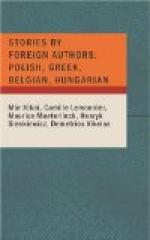The package, cut open, lay before him, shone upon clearly by the afternoon sun, and on it was an open book. When the old man stretched his hand toward it again, he heard in the stillness the beating of his own heart. He looked; it was poetry. On the outside stood printed in great letters the title, underneath the name of the author. The name was not strange to Skavinski; he saw that it belonged to the great poet, [Footnote: Mickiewicz (pronounced Mitskyevich), the greatest poet of Poland.] whose productions he had read in 1830 in Paris. Afterward, when campaigning in Algiers and Spain, he had heard from his countrymen of the growing fame of the great seer; but he was so accustomed to the musket at that time that he took no book in hand. In 1849 he went to America, and in the adventurous life which he led he hardly ever met a Pole, and never a Polish book. With the greater eagerness, therefore, and with a livelier beating of the heart, did he turn to the title-page. It seemed to him then that on his lonely rock some solemnity is about to take place. Indeed it was a moment of great calm and silence. The clocks of Aspinwall were striking five in the afternoon. Not a cloud darkened the clear sky; only a few sea-mews were sailing through the air. The ocean was as if cradled to sleep. The waves on the shore stammered quietly, spreading softly on the sand. In the distance the white houses of Aspinwall, and the wonderful groups of palm, were smiling. In truth, there was something there solemn, calm, and full of dignity. Suddenly, in the midst of that calm of Nature, was heard the trembling voice of the old man, who read aloud as if to understand himself better:
“Thou art like health, O my birth-land Litva! [Footnote: Lithuania.] How much we should prize thee he only can know who has lost thee. Thy beauty in perfect adornment this day I see and describe, because I am yearning for thee.”
His voice failed Skavinski. The letters began to dance before his eyes; something broke in his breast, and went like a wave from his heart higher and higher, choking his voice and pressing his throat. A moment more he controlled himself, and read further:
“O Holy Lady, who guardest
bright Chenstohova,
Who shinest in Ostrobrama
and preservest
The castle town Novgrodek
with its trusty people,
As Thou didst give me
back to health in childhood,
When by my weeping mother
placed beneath Thy care
I raised my lifeless
eyelids upward,
And straightway walked
unto Thy holy threshold,
To thank God for the
life restored me,—
So by a wonder now restore
us to the bosom of our birthplace.”




